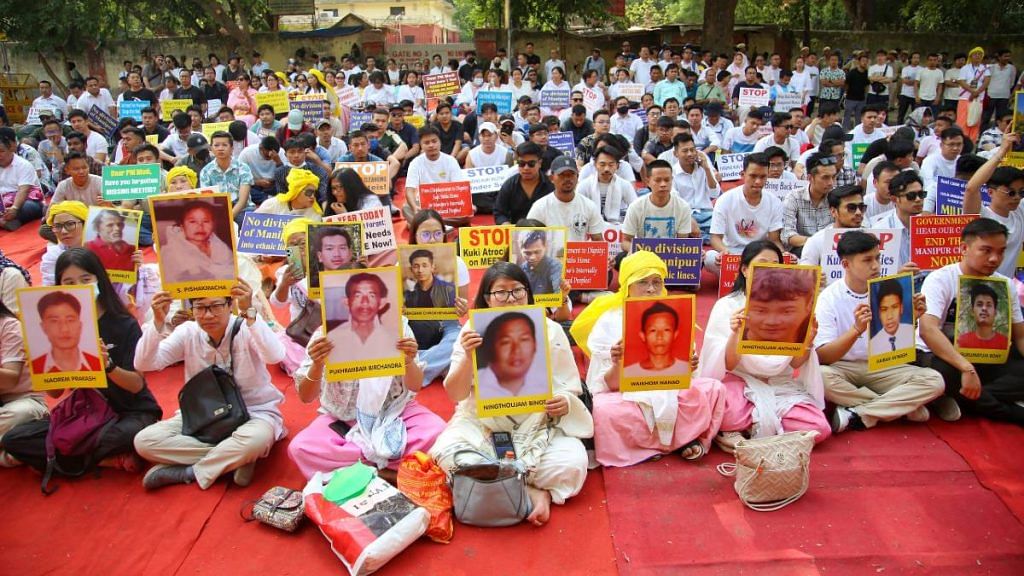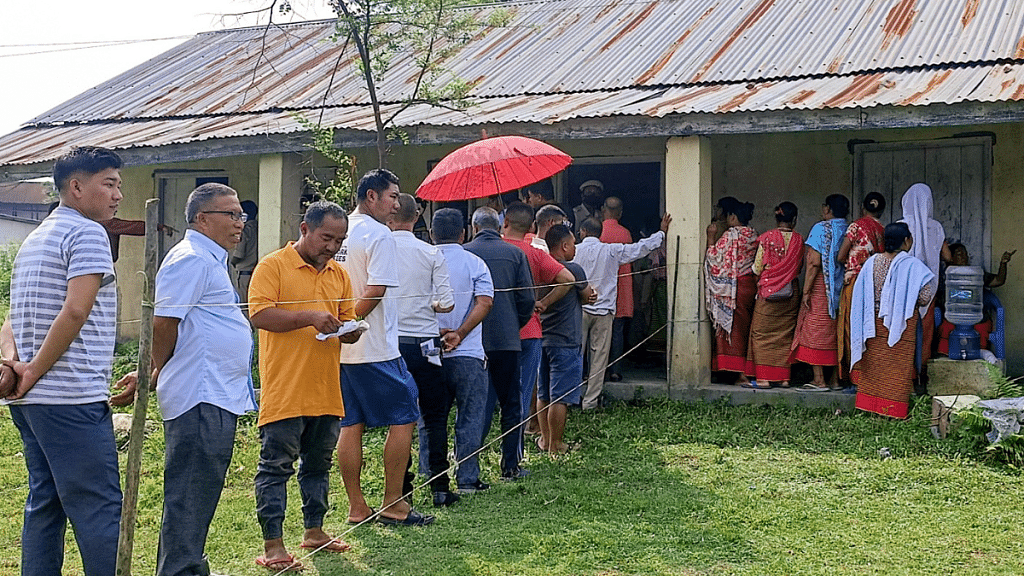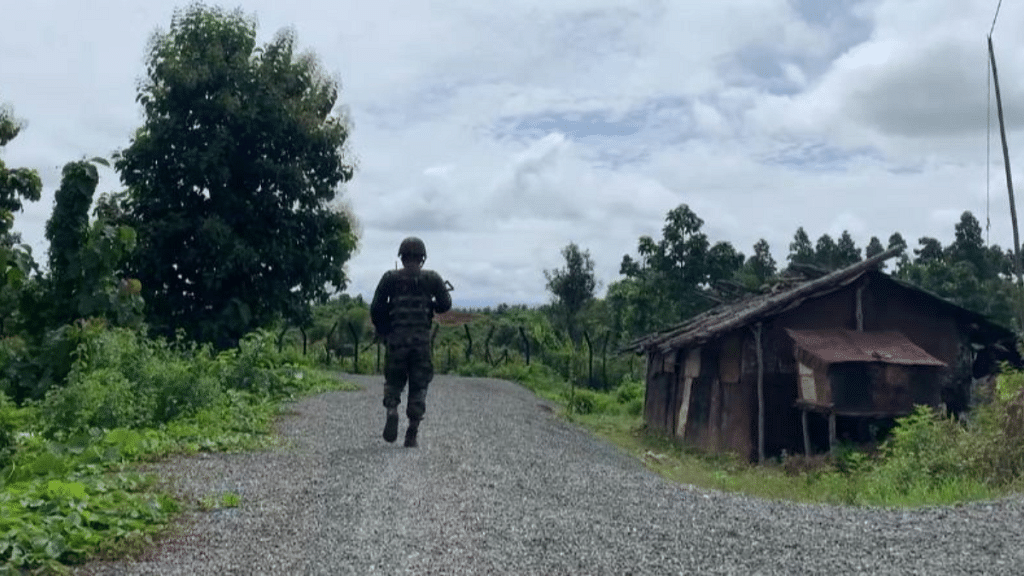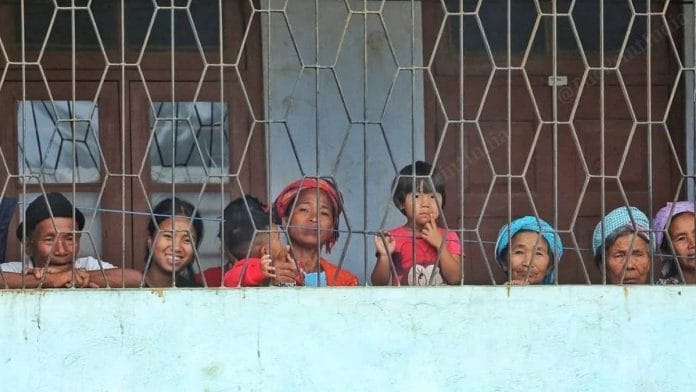Over a year since ethnic violence erupted in Manipur, people are slowly losing hope. Thousands who fled their homes fear they may never return, as one of India’s longest-running conflicts drags on with no resolution in sight. Unlike other states, like Gujarat in 2002, where violence between communities was swiftly contained, the situation in Manipur continues to be volatile. With elections over, will the new Narendra Modi-led government finally address Manipur’s plight with the urgency it deserves?
In May 2023, simmering tensions between Manipur’s Kuki-Zo-Hmar and Meitei communities boiled over into violent clashes. Fearing for their safety, people of the Kuki-Zo-Hmar community fled back to the hills, while Meiteis in the hill districts evacuated to the valley. But even as they ran, leaving everything behind, they clung to the hope that their displacement would be temporary. Yet, as time passes, the division between the hills and the valley only becomes more pronounced and lawlessness prevails.
Just last Saturday, alleged militants set fire to two police outposts and dozens of houses in Jiribam district, with the flare-up of tensions causing some 600 people to seek refuge in Assam’s Cachar.
The crumbling of trust in the system is now palpable. There’s a profound sense of betrayal that the state (read Centre) has failed to safeguard its citizens within their own homes. After all, safety and protection are fundamental rights that any state is obligated to guarantee. This has shattered people’s faith in the government and the feeling of alienation is intensifying with each passing day.
In the wake of the grand election season that swept across India, the central question has become whether the crisis in this small but strategically important border state will finally be tackled seriously.
Also Read: Neglected child Manipur crying for help from double-engine govt that laid ‘strong foundation’
Devastating apathy
More than 60,000 people in Manipur are internally displaced in their own country. Many are stuck in relief camps with not even a minimum subsistence allowance, while others continue to survive on the love and compassion of others—who, in turn, are running out of resources and reserves.
On top of this, residents in hill districts like Churachandpur and Kangpokpi now face restricted access to Imphal airport, resulting in difficulties in obtaining essential goods, medicines, and healthcare, among other things. Life isn’t easy for everyone in Imphal either. Not everyone has the luxury of travelling by air, and many residents are effectively trapped in a landlocked state, unable to pursue business or educational opportunities outside their immediate vicinity.
In reality, both sides have axed their feet and need rescue, but there’s little help coming even from within the Northeast region.
When the Jiribam violence led to hundreds crossing the Jiri River to neighbouring Assam, they weren’t exactly welcomed with open arms—the state government responded to their arrival by immediately tightening its border.

While concerns about security and infrastructure burdens may be behind this, it is also essential to consider the plight of those fleeing Manipur in distress. State policies should reflect humanitarian principles of compassion and solidarity so that no one is left abandoned during crises.
What is not in doubt is that the prolonged crisis in Manipur is bound to have a spillover effect on neighbouring states. Northeast leaders should have acted early to help resolve the situation, but concrete actions have been scarce, except for a few like Mizoram, where about 9,000 displaced people from Manipur are living.
United efforts from Northeast leaders could have significantly alleviated the situation. However, their lack of unity has resulted in a missed opportunity to leverage their collective strength. It’s crucial for them to recognise that one state’s problems resonate throughout the entire region. Manipur’s plight alone is potent enough to dent the brand image of the entire Northeast.
Election oasis
Despite ongoing violence, the general elections unfolded relatively smoothly in Manipur, bar the odd boycott call and a few incidents of disorder and firing at some booths, necessitating repolling in them.
But overall, the elections were a poignant commentary on the unrest—a subtle reminder that if there had been enough political will, the violence could be curtailed. Similarly, the urgency to vote trumped people’s other grievances, with the two Lok Sabha seats recording over 70 per cent voter turnout.
This was a rare moment of unity for the warring Meitei and Kuki-Zo-Hmar communities, as they together voted out the party that stood a silent spectator to their miseries, with the Congress winning both seats.

In the end, the people of Manipur sent a powerful message—that even amid turmoil and strife, the voice of the people cannot be silenced and that they have a collective wisdom regarding political representation.
Nevertheless, there’s a long road ahead before lasting peace and stability can be achieved.
The people must also have the maturity to look beyond the divide now, and collectively and truly yearn for peace to return. Beyond this, peace entails more than just the absence of conflict. It requires courage and will on the part of the central government to thoroughly examine the grievances of people, both in the hills and valley, and implement a definitive solution once and for all.
The neglected peripheries of India
Historically, border states like Manipur have been accorded less importance than their counterparts outside the region. Over time, this systemic neglect has perpetuated a sense of alienation and resentment among the people, fostering an environment ripe for discontent and dissent.
Shyam Saran, retired diplomat and former head of the think tank Research and Information System (RIS) for Developing Countries, spoke about this in a 29 March 2016 talk at IIT-Guwahati on the role of border states in India’s foreign policy.
“It is sometimes argued that for reasons of defence and security it may be necessary to limit the development of our border areas to only that which is necessary… Persisting with this approach can lead to a sense of alienation among the population of border states and dilute their sense of being part of the national mainstream,” he said.
Saran added that the border states play a crucial role in shaping the nation’s foreign policy.
“They represent invaluable assets in India’s pursuit of a harmonious, secure, and flourishing neighbourhood,” he noted.
Undoubtedly, India’s border states, particularly those in the Northeast, are strategically important in the country’s geopolitics. However, this has neither been adequately acknowledged nor translated into development for the region.

The government’s much-touted ‘Neighbourhood First’ policy rings hollow when the states guarding our borders are neglected.
India must now address the historical assumption that development in border areas should be limited for defence purposes.
A positive step was taken in 2022 with the announcement of a Rs 1,34,200 crore plan to develop air, road, and rail connectivity infrastructure for the Northeast region.
However, it is essential to recognise that connectivity extends beyond physical infrastructure to include a bridge built on a foundation of deeper understanding of the people. This requires sensitivity to their historical challenges and unique contexts. Further, development funds should not be doled out mindlessly, but must take into account various economic, cultural, and ecological particularities.
Will new govt be silent too?
It took the Prime Minister a leaked video of two Kuki-Zo-Hmar women being assaulted and paraded naked to break his silence on Manipur last July. “The guilty will not be spared. What has happened to the daughters of Manipur can never be forgiven,” he’d said. His words immediately put a new focus on Manipur, but did not lead to a solution, with the crisis continuing to fester for a complete year.
With the new NDA coalition government assuming power, it now remains to be seen if Manipur will finally be addressed meaningfully and constructively in political discourse, or if its welfare and aspirations will find a place within the national development narrative.
The people of Manipur will have every right to feel betrayed if the new government doesn’t break its silence and demonstrate its commitment to addressing the state’s issues and aspirations.
The absence of dialogue and engagement with Manipur sends a disconcerting message to its residents about being sidelined in the larger political landscape. It is imperative for the new coalition government to recognise Manipur’s significance and actively engage with its leaders and citizens to chart a path forward that is inclusive and beneficial for all.
It is imperative to address the historical grievances of both parties, the disparities, and the infrastructural deficiencies between the hill and the valley, rather than simply urging people to return home. They must first have a home to return to.
Glimmers of hope
As a concerned citizen and a native of Manipur, my vision of India is profoundly shaped by the actions—or rather the inaction—of the nation towards Manipur. The continued neglect of my home state not only undermines the principles of justice and equality but also erodes the moral fabric of our democracy.
The treatment of Manipur goes beyond neglect. It symbolises the deep-rooted polarisation within India. In some narratives, the conflict in the state was erroneously framed as a Christian versus Hindu issue. This exacerbated tensions and clouded the true complexities of the situation. False narratives seeped into the public consciousness and made a resolution even more difficult.
It has also been disheartening to witness fellow Indians readily mobilise to protest for overseas causes, while turning a blind eye to Manipur. When did India take to the streets in solidarity with Manipur? Where is the outrage and outcry for our fellow citizens facing hardship and injustice? These questions demand introspection.
I have watched and documented with pain the stories of people I know or love who fled their homes. I have shared their tears, mourning our collective loss of possessions and lives, reaching a point from where there seems to be no return. We’ve had heartfelt discussions, acknowledging both sides, and realising that parting might be the only path to sustainable peace.
Hoihnu Hauzel is an independent journalist and founder of www.thenestories.com and www.northeastodyssey.com. She tweets @hoihnu. Views are personal.
(Edited by Asavari Singh)






